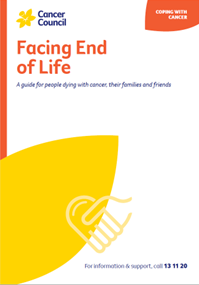- Home
- About Cancer
- Advanced cancer
- Facing end of life
- Emotional and spiritual needs
- Spirituality at the end of life
Spirituality at the end of life
Spirituality is an individual concept. For some people, it means being part of established religious beliefs and practices, such as Christianity, Judaism, Islam, Buddhism, or Indigenous belief systems. For others, spirituality is expressed as a personal philosophy.
For many people at the end of life, spirituality is a source of comfort and strength. Others find their beliefs are challenged by their situation and no longer find comfort in their spirituality.
In some cases, people may embrace a belief system that they have not been interested in before or had abandoned many years ago. Although many people do look for meaning at the end of their life, others are not interested in spirituality.
Talk about what you need
It may help to discuss your thoughts and feelings with a spiritual care practitioner (pastoral carer or chaplain). A spiritual care practitioner is part of the palliative care team and has the expertise to discuss spiritual issues, whatever your beliefs.
You may wish to discuss the meaning of life or your beliefs about death. A spiritual care practitioner can also provide companionship.
Following spiritual practices
Some people find comfort in prayer or meditation, and gain support from knowing that other people are praying for them or sending positive thoughts their way. Many religions have specific practices for when people are dying.
If you want to follow certain rites in a hospital or palliative care unit, it’s best to discuss this with the staff in advance. They will be able to help you find the space and time to do this, and your customs can often become part of your palliative care plan.
Podcast: Living with Dying
Listen to more episodes of our podcast for people affect
More resources
Prof Jane Phillips, Head, School of Nursing and Professor, Centre for Healthcare Transformation, Queensland University of Technology and Emerita Professor Palliative Nursing, University of Technology Sydney, NSW; Prof Meera Agar, Palliative Care Physician, Professor of Palliative Medicine, University of Technology Sydney, IMPACCT, Sydney, NSW; Sandra Anderson, Consumer; A/Prof Megan Best, The University of Notre Dame Australia and The University of Sydney, NSW; Prof Lauren Breen, Psychologist and Discipline Lead, Psychology, Curtin University, WA; David Dawes, Manager, Spiritual Care Department, Peter MacCallum Cancer Centre, VIC; Rob Ferguson, Consumer; Gabrielle Gawne-Kelnar, Counsellor, Psychotherapist and Social Worker, One Life Counselling & Psychotherapy, NSW; Justine Hatton, Senior Social Worker, Southern Adelaide Palliative Services, Flinders Medical Centre, SA; Caitlin MacDonagh, Clinical Nurse Consultant, Palliative Care, Royal North Shore Hospital, Northern Sydney Local Health District, NSW; McCabe Centre for Law and Cancer; Palliative Care Australia; Belinda Reinhold, Acting Lead Palliative Care, Cancer Council QLD; Xanthe Sansome, National Program Director, Advance Care Planning Australia; Kirsty Trebilcock, 13 11 20 Consultant, Cancer Council SA.
View the Cancer Council NSW editorial policy.
View all publications or call 13 11 20 for free printed copies.

